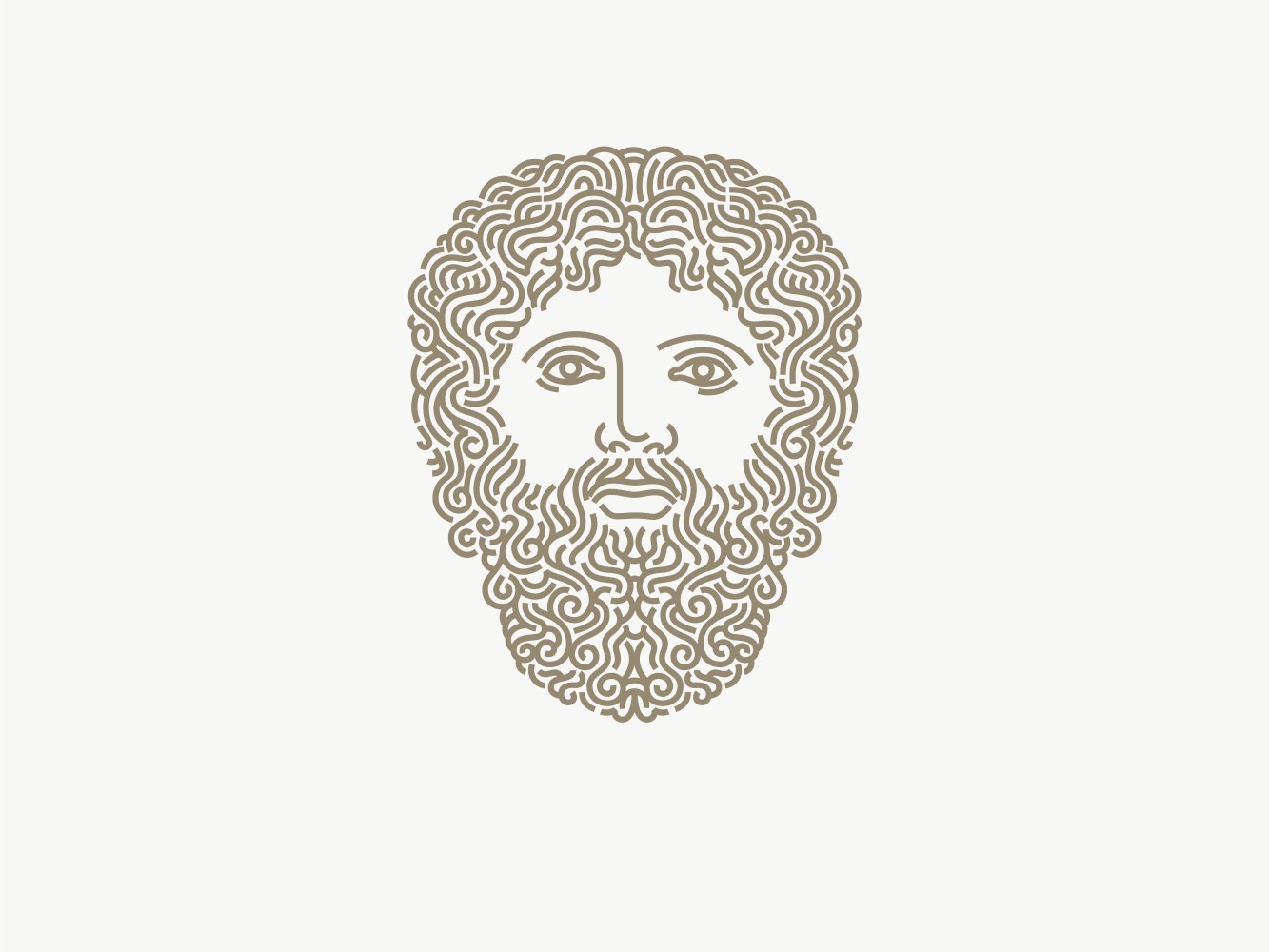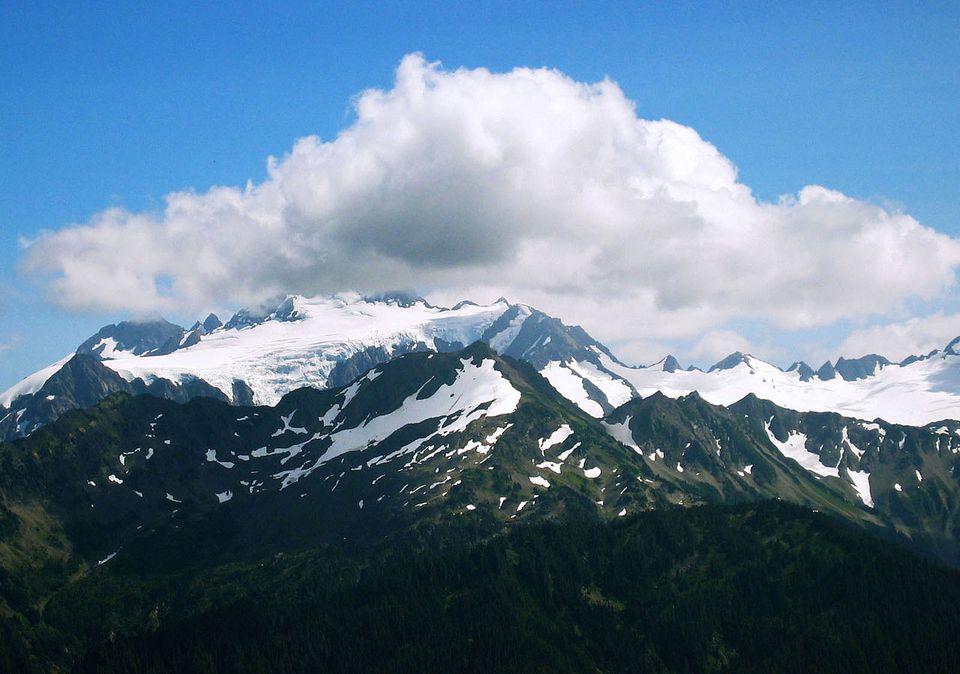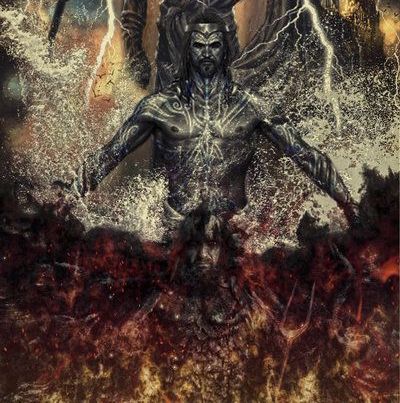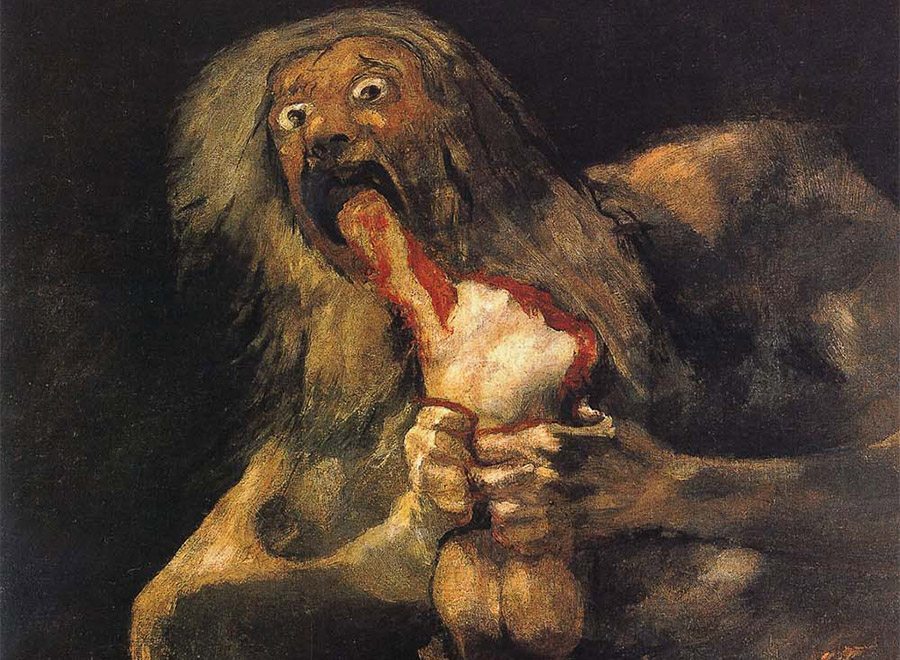1
Gaea, now known to the Titans as Pandora “bringer of gifts”, hath expounded great wisdoms as matriarch of her tribe. As a women of great beauty and esteem for her shamanistic knowledge of the secrets of this world, men marveled at Pandora’s prowess, and believed that by following her cult, they might also be shown the mysteries of life.
Despite her great wisdom, Pandora suffers. She tosses and turns on her bedroll desperately clawing her way through another nightmare memory; the blade entering the belly of her lover, his blood soaking the soil, the pain is buried deep but ever present as it shocks her into a waking state. Sweat covers her face. She rises from the bedroll looking back at Ouranos’ large body sleeping peaceful as she exits their wagon mobile-home and walks down to Okeanos Potamos.
At the waters edge she looks up at the moon lit sky and recalls the prophecy of the Earth in between reflections of her only love. Pelasg taught her astrology, which she in chain taught to Ouranos. With that knowledge Ouranos taught the men of his clan as high-priest while Pandora taught men to respect and know the spirits of the earth.
Though Ouranos had many wives, Pandora was given greater status as the eldest, and with Ouranos Pandora had mothered eighteen children. First there was Briareos, Gyes and Cottos, all of which had started their own clans when they were of age, numbering no less than fifty men per clan. Collectively they were known as the Hekatonkheire tribe. They settled originally in the periphery of their original homeland of Okeanos Potamos.
Next Ouranos and Pandora had three stubborn brutes they named Arges, Steropes and Brontes. All three where gifted in the skills of the forge though deformed in character, and so they were named Kyklopes as a tribe.
The Kyklopes were difficult to lead and so with the power of the Sacred Blade Ouranos banished them to the land of Tartaros, at the center of the Earth where volcanic rock and ash persist. Unlike their elder brothers, they formed smaller clans. In isolated seclusion they lived by barbaric ways.
Finally the Titanes were born, and remained under the leadership of Ouranos and Pandora. First born was Basileia, nicknamed Theia, which meant “Goddess” as she was most beautiful, good natured and skilled in divining. She helped raise her younger siblings.
The second born and eldest amongst the boys was named Okeanos after the body of water which he was born beside. After him were his brothers Koios, Hyperion (“the High-One”), Krios, Iapetos, and the youngest Kronos & the sisters Tethys, Rhea, Themis, Nemusyn and Phoebe.
Pandora prostrates deeply into the wet soil and thinks of each of her children as she speaks with lips swishing in the mud, “I have been waiting for the moment mother. Eighteen children later and the task seems further and further away, though I have not lost faith,” she reflects.
2
 Ouranos was the last of his his brothers to remain in their homeland of Potamos thanks to the Sacred Blade which he uses to protect the Titan’s from his cousins the Aryans who surround them on all sides, sons of his uncle Gyomar “the noble” (“Arya”) .
Ouranos was the last of his his brothers to remain in their homeland of Potamos thanks to the Sacred Blade which he uses to protect the Titan’s from his cousins the Aryans who surround them on all sides, sons of his uncle Gyomar “the noble” (“Arya”) .
Ouranos sits atop his wagon with the blade held high for daily court proceedings. Nemusyn leads a choir of nine muses she adopted as children, they sing in honor of their lord the Sky Father, as well as their high-priest.
After introductions Ouranos makes rulings on potential raids, future migration, and the distribution of goods.
Later he takes his sons Okeanos, Hyperion, Koios, Krios, and Iapetos and heads to the border to meet with neighboring Aryans to draw up new boundaries and maintain peace with the threat of blade beside him. Only Kronos is left behind to oversee his mother and sisters, notably including his faithful wife Rhea.
When he returns Ouranos comes down from his horse, and approaches Pandora who receives him with a blank faced kiss. Ouranos then places his hand on his son Kronos’ shoulder and gives a gentle but warm squeeze before turning to the tribe and shouting, “The Titans march on,” his fist raised in the air. The tribe cheers in response.
Now in sheath the blade appears to glisten in the summer sun. Kronos watches it with a hungry glance. Noticing the eros in her son’s eyes as he stares down at the blade Pandora leans in to whisper into his ear, “One day you will be chief.” Kronos looks back with at his mother with storgic passion.
3

Pandora was a sensitive mother and so she grieved the loss of her exiled sons, the Kyklopes and the Hekatonkheires tribes, though she was powerless to return them without the Sacred Blade. She requested the aid of her diplomatic daughter Themis who argued for her brothers return to no avail. Tethys and Phoebe tried together to charm their father in vain. Even when Nemusyn sung him a sweet song his softened heart remained firm.
One night after the celebration of successful raid, Kronos unable to sleep went to Potamos to worship the Sky Father. Though surrounded by the soothing sound of crickets he heard the angry grumbles of a giant coming from his parents wagon which was somewhat secluded from the others. He crept by the opening and saw his drunk father shouting incomprehensibly as Pandora grabbed onto his tunic. Ouranos shoved her down hard and the yelling stoped.
Ouranos turns to his bottle which is beside the bed and takes a long swig of poison. While he’s not looking Pandora goes for the blade but is unsuccessful. The drunk Ouranos shoves her down again with furry in his eyes and Pandora is struck in the head by a rock she used for divining.
Kronos is stuck in shock as he watches the blood pouring from the back of his mothers skull. Her eyes turn to see him at the wagon entrance before she fades from consciousness. The intoxicated Ouranos slurs some more gibberish as he turns from the body to sit back on his bed roll. He goes again to his drink. Then takes the blade out and sits with it in his lap for a moment before tossing it beside himself standing again slowly, dizzy and with shakey balance.
Kronos is still fixated on his mothers lifeless face. Her mouth is still partially open along with her eyes which are calm as if she were in thought, on her mouth almost a slight smirk. His halt feels like forever.
Suddenly, “Kill your father,” shouts the living-dead face of mother snapping Kronos out of his daze and back to the moment. He bursts through the wagon entrance and into his father like a whirlpool, snatching the Sacred Blade on his way in and turning it against Ouranos, stabbing the old chief in the heart. His slain father’s eyes stair up at him in surprise as he falls with a thud.
Kronos takes his fathers body and dumps it into Potamos. He then returns to the tribe with the sacred blade, using its magic to transform the sword into a scythe which he slams down as he takes the seat of the king atop his wagon.
He honorifically has his mother buried in the earth under her old title Ge, though rather than free his brothers the Kyklopes and the Hekatonkheires he sends a she-dragon with the upper body of a beautiful woman, and the tale of a scorpion to guard their imprisonment in Tartaros.
Now Kronos understands the power of the blade which belongs purely to desire and the ability to manifest whatever can be imagined. The Titans shiver in the presence of Kronos now sitting by the great fire at the center of the settlement. He declares, “I Kronos have slain my father and taken the blade which grants me the position of high-priest. Long lived Ouranos, son of Ywan, brother of Jobath, Dodan, Kethimos, Tarsos and Eliseos. Long live Kronos.”
4
Under the rule of Kronos the tribe had migrated southwest along the “world river” known as Eridanos. Here they encountered the indigenous children of Gaia and Pelasgos (Pelasg) whom they called Pelasgians, but also his uncle’s tribes of the islands and of the coasts, the Dodani, Kethimoi, Tarsi and Elisei.
Kronos brought to them more advanced agricultural techniques and thus made his tribe the strongest and most influential over the region. His reign which extended to the island of Kition was peaceful despite the violence which brought him to power.
Kronos’ brothers and sisters the Titanes had refused to follow him remaining back at Potamos. The Aryans allowed them peaceful stay and protection from the Mesheki and Semite tribes as long as they made tribute. Basileia was elected as their high-priest as the elder of the clan. With her brother and husband Hyperion she bore three children named Helios, Selene and Eos.
The Titanes had their own peace for a time though Chaos returned by invitation of her brothers Krios and Koios. Fearful of their brother Hyperion’s power as husband of the high-priest they conspired to kill Hyperion and Helios. Hyperion was put to the sword, Helios thrown into Eridanos to drown.
When Selene learned of the deaths of her father and brother she committed suicide by throwing herself into Eridanos.
Basileia fell into deep depression and despair, only to disappear one night during a great storm after a supernatural vision in which Helios comforted her, explaining that her Titan brothers would be punished for their crimes and that he and Selene would be transformed into the immortal natures of “Holy Fire” (Sun) and Moon.
In place of her elder sister, whom the Titanes honored now only with the title of Theia, Themis “the fair” was elected as high-priest amongst the Titanes.
Meanwhile, back down south by the sea, Kronos had heard in the whispers of his mother Gaia, a prophecy that he would be displaced by his own son as he displaced his father. Therefore each son born to him by his wife Rhea had to be disposed of. He used the magic of the blade to accomplish this.
The first two sons, Ade and Posidon were eaten moments after birth right in front of their mother Rhea who had already named them. The youngest named Ziwo was however birthed in secret from Kronos in the cave on Mount Dicte. She then brought the infant north to the remote Mount Olympos. There in the wilderness Rhea made contact with her siblings whom she left to care for Ziwo.

Rhea assigned the nymph Amalthea specifically as foster mother, and as nurses two other maidens named Ide and Adrasteia, daughters of a tribal leader from Kition named Melisseos. For protection she left her armed attendants, trained dancers known as the Kuretes.
5
In the care of family, the nymphs and the Kuretes the bright faced infant Ziwo grows into a great and powerful king. He’s married to his cousin Metis, daughter of his uncle Okeanos. Ziwo had pursued Metis sexually throughout his teenage years to no avail though as an adult the two become rather close. Metis teaches Ziwo the traditions of their ancestors and the history of their Titan homeland while Themis teaches him justice.
Kronos and Rhea continued to rule and raise their three daughters, Hestia, Demeter and Hera, each of whom came to prominence and respect in Kition.
Hestia became something of an early architect, teaching the populous how to build greater dwellings. She laid foundations for domestic life, the family, and the village. Though considered a “virgin”, Hestia was a lover of women in romance, and conceived no children.
Demeter was a great farmer of grain, and had brought the wheat crop into the everyday Pelasgian diet as she was a great sower of the seed. Hera on the other hand presided over marriages though in absence of a suitable groom she remained single.
In Olympos Themis serves Ziwo as judge in a case against her brothers Krios and Koios, both of whom accused of murder by Koios’ own wife and sister Phoebe, known to Titanes as a great intellect and the prophetic voice of Ge. Themis determines them guilty and Ziwo sentences them to three-hundred years in Tartaros though the two manage to escape and deflect to Kronos.
Meanwhile Ziwo begins planning for the capture of his father’s kingdom. As recommended by his aunt Phoebe, Ziwo journeys to the center of Earth to gain the support of both the Kyklopes and Hekatonkheires tribes. He defeats the she-dragon with only a sword, liberating his imprisoned uncles and their tribes and demonstrating great bravery. For this he is rewarded by the Sky Father with the power of lightening which now courses around his very being, the warmth of a king.
Kronos is shocked to discover he has a living son who has become king in the mountains. He remembers the prophecy and declares war on the Olympians to the north and so the battle between Olympos and the coastal domain of Kronos begins.
The two sides meet in Thessaly for battle. Kronos sets camp in Mount Othrys. While Ziwo uses his mastery of lightening, Kronos utilizes the Sacred Blade to conjure mystical beasts that fight alongside his army. The Olympians and their allies are forced on more than one occasion to retreat from such forces.
On the fifth year of battle, Metis creates a magical potion designed to sever the sacred blade’s bearer from the magic of the blade. She then impersonates a maiden and slips the potion into Kronos’ drink nightly, effectively crippling the great king.
One night after a month of regular consumption Kronos wakes from sleep gagging violently before fainting back into a dream. His body begins to contort in such unnatural fashion only to be torn at the tummy by his two grown sons Ade and Posidon who arise from their father’s stomach to their own amazement.
In confusion they leave Kronos’ private chambers to head to their brother Ziwo in the mountains following the song of muses which they are the only of Kition to hear. Ziwo wakens to welcome Ade and Posidon who appear as undead wretches before him, pale and and enraged. His grand smile warms them just a tad.

By the final year of battle Kronos has become delirious and lost still consuming the potion on a regular basis. This allows for an easy victory for the Olympians who take their time in assault with respect for Kronos’ Ywanian allies. Finally, even the allies lose hope and submit their forces to Ziwo.
After the Olympians officially take victory the three sons of Kronos led by King Ziwo confront their cowering father in his darkly lit hidden chamber. Kronos once a great man was now stripped naked without blade clothed in nothing but a rotting toga. In his mind he’s stuck in a time, continually he consumes his children.

Ziwo grabs the glimmering scythe which lays just beyond the entrance of the chamber and in an instant transforms the blade back into a sword. As the bearded, brawny, bare-chested king Ziwo walks forth Kronos crawls backward away from his son, a delirious maddened expression on his face as Ziwo with both hands lifts the blade above Kronos and stabs it into the floor before him with a thunderous rumble. A wave of electricity flows through the bones of the defeated titan.
Ade and Posidon grab their father’s limp body and drag him along as they join Ziwo on his victory march to the front of the palace where he is cheered by his supporters.
Themis approaches Ziwo with her hands out. Ziwo takes a minute to stare down at the blade grasped tightly in hand. He almost feels he can hear it whispering to him. Then with serious determined eyes he hands Themis the blade which has no affect on her fair mind as she places it in sheath at her hip.
“None shall bare the blade again. I will bring it to Tartaros and toss it into the lava,” Themis declares.
“And what of our father?” ask the brothers of Ziwo.
“My father also shall be placed in Tartaros for a three-hundred year sentence. His soul now belongs to Nemesis,” replies Ziwo.
Koios and Krios attempt to escape but are captured by a clan of Kyklopes along with the honorable Okeanos and Iapetos. The treacherous brothers are given a similar sentence to their father.
6
Following the war Ade is assigned the responsibility of laying down the rules of burial, funeral rituals and honors paid to the deceased. He becomes the center of the cult of the dead. Posidon, a great sailer, builds a mighty naval fleet on the coast of Ywanian lands. He is assigned responsibility over trade relations with the other Mediterranean civilizations.
Ziwo plans to take off on a pilgrimage to Potamos to retrace the footsteps of his people. First the mighty king ascends to the highest point of Mount Olympos atop a white steed. He stares off into the sun rise and honors the name of his cousin Helios with the sands of time which he lets slide through his fist to blow away in the wind.
Ziwo closes his eyes as his face becomes warm and takes a deep breath of fresh air. He sees glory in the future of the Olympians. All the Ywanian settlements take note. The civilization of giants has been replaced by a new generation, fierce as the last but with the hope of a better nobler future.
The sacred blade shall eventually fade from memory, though its shadows shall remain, monstrous shadows which will darken the blood of the humans of the region for centuries to come. Long live the Olympians.



Pingback: My Homepage